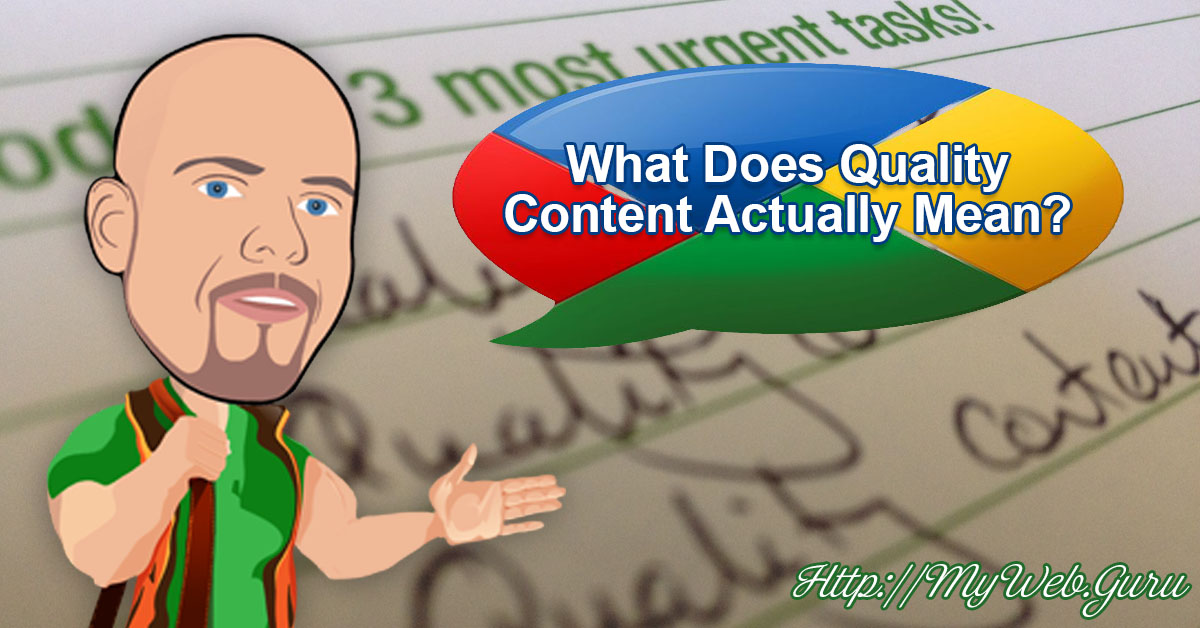
Nine Tips for Making Your Website More Accessible
July 30, 2015
The Power of Online Reviews for Local Businesses
August 28, 2015Every marketer knows that quality content helps to engage website visitors and boost search engine rankings, but not everyone can define what “quality content” actually means. In this article, I’ll try to define exactly what quality content is. First, let’s look at the benefits:
- Google rewards high-quality content with higher search engine rankings
- Higher search engine rankings is directly linked to increased website traffic
- Quality content strengthens customer loyalty to your brand
- It boosts your credibility
- It will naturally attract higher-quality inbound links and increase content sharing
While the definition of quality content varies depending on your specific industry and target audience, there are some common factors that determine whether or not your content is high quality. Following are some of the key features of quality content that you can use to ensure your content strategy is on the right track.
Longer-Form Content
Articles that have a greater word count – around 1000 to 2000 words – have a better chance of ranking more highly with Google, as Google favors more in-depth content that delivers useful information to the audience. When creating content, try to explore the topic in more depth, and include links to other relevant pages on your site and to external resources.
Clear, Accessible Content
Google values trustworthy sites, which means you need to write professionally. This doesn’t mean using longer words; the key is to deliver comprehensible content that is free of errors and is easy to understand. To keep human readers and Google bots happy, avoid spelling and grammatical errors, make sure your facts are correct, and organize your content logically, using clear page titles that explain what readers can expect to find out.
Correct Formatting
To make sure readers and search engines can understand your content, it must be formatted correctly. Use headings and sub-headings, bullet points, bold and italic fonts, more white space, and shorter sentences and paragraphs to make your content more readable and scannable.
Author Expertise
According to the most recent Quality Rater Guidelines, Google now puts a higher value on sites with a high level of expertise, authoritativeness, and trustworthiness. Ask yourself the following questions: What experience and credentials does your author have? Can you support your content with trustworthy sources? Has the author written other well-ranked pages on the same topic?
Social Signals
Even though social signals may not directly affect search engine rankings, they still have an indirect impact. The more shares a piece of content gets, the more inbound links it is likely to generate, and these are a key ranking factor. Does your content feature social share counters? Google may access these numbers. Google Plus content has also been shown to rank highly, so make sure you’re active on this channel.
Valuable Content
Ultimately, it’s human readers that will determine if your content is valuable, but this can have a significant impact on search engine rankings (more shares, links, comments, and more time spent on your website). To offer more value, make sure you address the key concerns of your audience with useful content, or at least be entertaining.
Diverse Media
In terms of attracting shares and links, visual content is often even better than text. Using various forms of content such as infographics, photos, videos, and slide presentations can give your pages a significant ranking boost. To further enhance visual content and improve SEO, make sure you make it accessible to all. For example, publish transcripts to videos, and label all visuals with appropriate alternative text.
Other Practical Takeaways for Producing High-Quality Content
- Clearly display your contact information on every page
- Add fresh content regularly to your website
- Update older content
- Avoid showing too many ads or affiliate links, or avoid them altogether
- Avoid keyword repetition
- Avoid duplicate content
- Stick to one topic per web page
The Bottom Line
As search engines regularly update their algorithms, the meaning of “quality content” will continue to shift, but for the time being these guiding principles are a solid foundation on which to build your content strategy. As well as catering to the guidelines of search engines, quality content must ultimately provide real value to your target audience. Only then will you be able to improve audience engagement, increase shares and links, and improve your search rankings.
Do you need help with website development? Are you worried your web design and content are not meeting the high standards required in today’s competitive online environment? Give me a call at (321)300-5024 and we can discuss any of you digital marketing requirements, with no obligation.



